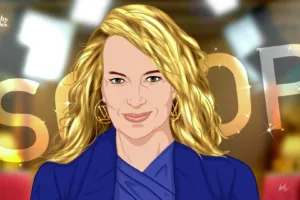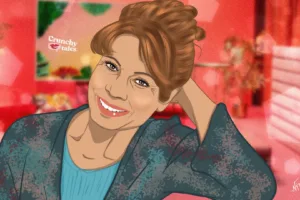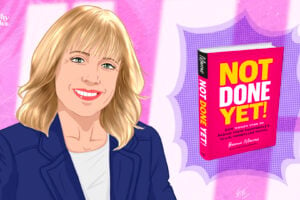Feminist Emma Rees: Midlife Crisis? A luxury
There are many stereotypes and misconceptions associated with midlife and especially with feminism. Emma Rees, Professor of Literature and Gender Studies at the University of Chester and Director of the Institute of Gender Studies is able to smash them all. Throughout her career, she has written extensively in the field of gender and representation in literature and culture. Amongst her books, the thought-provoking and richly researched “The Vagina: a Literary and Cultural History” (published in paperback by Bloomsbury in 2015) acclaimed by critics and people. Emma runs the international, interdisciplinary biennial Talking Bodies conference and in 2016 she took up her role as inaugural Political Writer in Residence at Gladstone’s Library (Hawarden). Her feminism? Intersectional. “It focuses on gendered oppression as only one of many structural systems of inequality”. Ageism is one of them.
Emma, these days a lot of women are uncomfortable with defining themselves as feminist, yet you insist on being identified that way and much of your work has been categorised as feminist. What does this term mean to you?
I’d hope that all of my work could be called ‘feminist’ – it’s fundamental to my identity and beliefs. In the present geopolitical climate, the need for equality is more urgent than ever before – we have a mendacious misogynist in the White House and austerity – a policy which proportionately affects more women than men – emphasising divisions in the UK (and don’t even get me started on Brexit!). Feminism is about challenging those power structures which mean that a minority profit disproportionately on the backs of the majority. It’s about asking ‘why’, and refusing not to be fobbed off or ignored. Why are there more FTSE 100 CEOs called ‘John’ than there are FTSE 100 CEOs who are women? Why did the woman who made your ‘This is what a feminist looks like’ T-shirt work in intolerable conditions in a tinderbox of a clothing factory in Dhaka? Why – on average – are 14 women murdered in Mexico every single week? And why is a young man in the UK – subject to the same climate of machismo bullshit – more likely to die from suicide than by any other means? It’s an unequal world. Feminism is about equality. It’s a no-brainer for me.
We’re still fighting for a lot of rights. Don’t you think it’s time to stand up against ageism, too?
My feminism’s intersectional: it focuses on gendered oppression as only one of many structural systems of inequality. Race, ethnicity, sexuality, religious beliefs, physical ability, and age all play their parts in the messy, complicated life of any given individual – and all of them can be used to oppress that same individual. We need to follow the money – who profits from systemic oppression? Ageing is lucrative for companies who would go bust overnight if all middle-aged women were suddenly to say: ‘You know what? I’m perfectly happy and content in my own skin’. While he is ‘distinguished’, she is ‘wrinkly’, and so on. We need to change the conversation about middle age because we need to change the conversation about who benefits from us feeling insecure and unhappy in a culture which so ardently privileges the idea of youth.
Throughout your career, you have written extensively on representations of gender in literature and culture. Do you think the mid-life crisis is universal or more culture-specific? Is that a myth?
I don’t think there’s any such thing as the ‘midlife crisis’ – at least, not in the traditional sense of the term. The pressures on someone in their late forties/early fifties are different – for the lucky ones, relationships and careers are sorted, and the inevitable losses that have been lived through have granted a painful, but invaluable, sense of perspective. It is a privilege to reach middle age in your 40s or 50s – it’s certainly better than the alternative. To have a ‘midlife crisis’ is a luxury: it means you’ve reached a good age, and have the space and time for the kind of introspection and reflection that is so important, and yet not universally available.
You are a professor (with a piercing), a feminist and middle-aged. For several people, that could be quite disturbing. How do you find the strength to overcome your particular circumstances?
That’s an interesting choice of words! I thrive on ‘disturbing’ people, if that means forcing them to think about situations which they previously thought were natural, when in fact they’re socially constructed. The strength comes from wanting others to be able to realise their full potential and to feel valued. It also comes from the kind of anger that’s a great motivator, and from a firm belief in success being the best revenge.
Your work in a still largely male-dominated field. What would you suggest to a talented woman who has to deal every day with a challenging yet difficult environment?
Mediocre men are everywhere in positions of power. Be polite, work hard, and don’t forget to ask those ‘why’ questions at every level of interaction. Find your voice by finding a mentor, and, where necessary, apologise afterwards, rather than asking for permission first. Life’s just too short, and mediocre men will try to hold you back.
Some people still think feminists burn their bras (or don’t wear them at all). Don’t you think it’s time to confess we do love sometimes wearing silky underwear, too?
It shouldn’t be a confession – it should be a celebration! Be confident and sexy on your terms – not according to the dominant cultural script of wherever you live. Burn your bra, or don’t. Turn it into a catapult for small boulders, or don’t. Just remember the privilege that means you could buy it for yourself when you wanted to, and demand that similar luxuries should be available to all women everywhere. For many women, just getting through the day without being murdered is ‘luxury’ enough.




